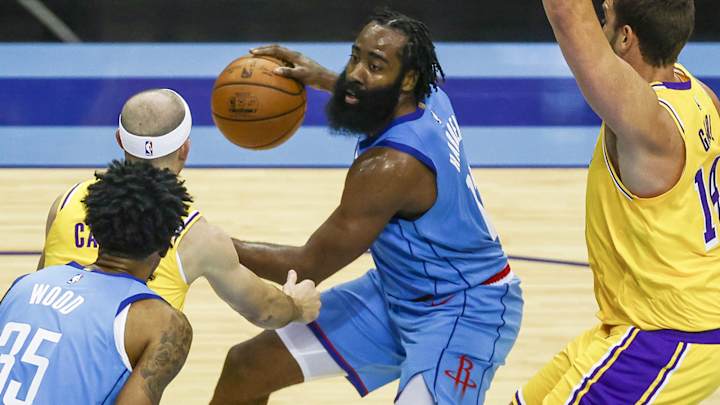Will the Rockets' Struggles Accelerate a James Harden Trade?

It didn’t take long for any early-season optimism to dissipate in Houston.
The Rockets entered 2020–21 with some confidence despite James Harden’s trade request, looking at a reshaped roster as a potential contender in the Western Conference. Does Harden agree with that sentiment after Houston’s 3–6 start? Not exactly.
“We're not even close, honestly, to [the Lakers]. ...and all the other elite teams out there,” Harden said after the Rockets 17-point loss against Los Angeles on Tuesday. "I mean, you can tell the difference in these last two games. We're just not good enough. Chemistry, talent wise, just everything. And it was clear these last two games."
Tuesday’s defeat marked the nadir of Houston’s season as it sits ahead of only the Timberwolves in the Western Conference. The Rockets have lost four of their last five. They dropped back-to-back games against Los Angeles by a combined 35 points on Sunday and Tuesday, with the latter loss featuring a taunt for the ages from LeBron James. Perhaps Harden could be placated if the Rockets looked like a competitive team in the West. That looks increasingly unlikely after nine games.
Houston’s defense has been disastrous early in the season en route to the league’s No. 21 defensive rating. Only the Nets allow more second-chance points. The Sixers are the only team to give up more transition baskets. The Rockets weren’t expected to be a defensive juggernaut considering the significant reliance on Christian Wood and DeMarcus Cousins, but it’s not just the personnel that’s plaguing Stephen Silas’ squad. The Rockets’ energy and effort is seriously lacking. Their defensive performance seems to be dictated by the shooting percentage on the other end. Houston spent much of the last two games flinging careless turnovers, loafing back on defense and allowing a flood of free offensive rebounds. Silas’s frustration on Tuesday was palpable, and rightfully so.
“We didn’t bring the right intensity to the game,” Silas said on Tuesday. “We’ve got to be a team that as adversity comes, you will meet that adversity with force. We’re not doing that.”
Harden has a fair point when he claims Houston isn’t good enough to compete with the top teams in the West. Wall is a shaky jump shooter. Christian Wood is currently more of an intriguing talent than a winning player. The rest of Houston’s rotation lacks both playmaking and size, with both P.J. Tucker and Eric Gordon now aging out of their respective primes. Playing out two more seasons in Houston would likely mark a wasted chunk of Harden’s best years.
But Harden fails to address the simple truth about Houston’s fade from relevance. The current roster’s shortcomings are directly attributable to his own decision making. Harden was, by most accounts, a driving force in the Chris Paul–Russell Westbrook swap, draining Houston of valuable draft capital. Westbrook provided impressive counting stats that proved largely fraudulent in the NBA bubble, and his own differences with Harden led to the most recent swap for Wall. Houston exited 2017–18 after a 65-win season, armed with Harden, Paul and plenty of assets to make potential upgrades. Dealing Paul eliminated Houston’s greatest chance to make impactful additions moving forward.
Harden can’t be solely blamed for Houston’s front offices decisions. But he is responsible for his own performance. There’s a version of Harden’s trade demand that isn’t completely out of bounds. He could have noted his request, shown up to training camp, then gunned for another MVP as the Rockets looked to stay afloat in the Western Conference. But we haven’t seen anything close to that level of professionalism thus far.
Harden’s jet-setting around the country cost him valuable time to work with his new teammates, and his play of late has been disappointing. Harden is averaging 17.4 points per game in his last five contests. He’s shooting 44 percent from the field and 34.7 percent from three on the season, getting to the free-throw line at his lowest rate since 2011–12. It’s not necessarily the shooting numbers that should frustrate Houston. It’s Harden’s current demeanor. He was purposefully passive on Tuesday night, content to spend much of the evening slinging passes across the court as the shot-clock wound down. Harden built a reputation in Houston as a tireless worker and a fierce competitor. He’s been neither of those things thus far in 2020–21.
Harden sent a clear message with both his play and his postgame words on Tuesday night. Will the Rockets abide by his request? It’s very likely we see Harden dealt before the trade deadline in March, though just how soon a deal will be struck is hard to parse. The Rockets claim they are “willing to get uncomfortable.” We're certainly at that point. But don’t assume that Tuesday night will spur a significant acceleration in Houston’s trade discussions. The Rockets remain determined to receive a significant haul for the second-greatest player in franchise history. If Philadelphia and other suitors aren’t ready to part with the necessary pieces, the discomfort could continue.
Tuesday night marked perhaps the lowest moment of the Harden era in Houston. It could also be the last. Harden's words postgame were as direct as you'll see from a superstar, and his frustration has bubbled over to Houston's supporting cast. The situation is devolving at a rapid rate. The Rockets owe it to themselves to hold their ground in the Harden negotiations, but if the right deal arises, Houston will likely jump on it. Harden's actions have led to an untenable situation. Tuesday's loss was the culmination of an organizational free-fall nearly 18 months in the making.

Michael Shapiro is a staff writer for Sports Illustrated. He is a Denver native and 2018 graduate of The University of Texas at Austin.